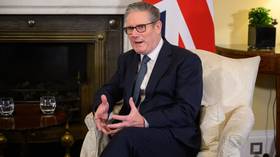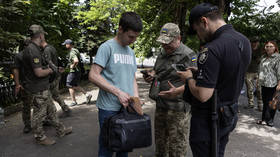Taliban assassinated Benazir Bhutto: Pakistan
The Pakistani government believes Taliban leader Baitullah Mehsud may be behind the assassination of former opposition leader Benazir Bhutto. U.S. officials have also named Mehsud as the prime suspect in the killing of the former Pakistani Prime Minister
Condemnation
Violence erupts
Russia's reaction
Pakistan's Interior Ministry says Benazir Bhutto had been on the hit list of terrorists ever since she came back to Pakistan.
It comes as world leaders continue to condemn Bhutto's assassination and voice concerns over the election in January.
Although Israel and Pakistan have no formal ties, Israeli President Shimon Peres is believed to have met Bhutto when they both attended UN General Assemblies in the 1980s.
He said Bhutto told him that if she became Prime Minister she would take steps to establish a relationship with Israel.
“She was a Muslim with a difference, a democrat with a difference, a leader with a contradictory situation. And yet she kept her charisma as a woman and her strengths as a leader,” Peres said.
After adding her signature to the condolence book at the Pakistan embassy, U.S. Secretary of State Condoleezza Rice said the way to honour Bhutto's memory was to continue democratic reform in Pakistan.
Washington is counting on Pakistani President Pervez Musharraf going ahead with a parliamentary election next month despite Bhutto's assassination, hoping it will lead to the restoration of democracy.
U.S. officials say the January 8 election, through which Bhutto hoped to return to power, is the biggest immediate concern in sustaining American policy in the volatile nuclear-armed nation.
In India, which has fought three wars against Pakistan, Prime Minister Manmohan Singh signed a condolence book at the Pakistani embassy in New Delhi.
He added his voice to international condemnation of the assassination, saying Bhutto's death was a great tragedy.
In Beijing, a Chinese Foreign Ministry spokesman said the visiting Japanese Prime Minister and the President of China have discussed Bhutto's death and expressed hope the situation in Pakistan would stabilise.
In the Russian capital many have been visiting the Pakistani Embassy to add their signatures to the condolence book.
Benazir Bhutto was killed on Thursday after a suicide bomber opened fire as she waved to supporters from a vehicle while leaving an opposition rally in the Pakistani city of Rawalpindi.
Bhutto was laid to rest the next day at a family mausoleum in Pakistan's Sindh region, amid a raw outpouring of grief by hundreds of thousands of mourners.
Now a row has erupted over how Benazir Bhutto died. Either she was shot dead as earlier reports claimed, or she died from head injuries received from the force of the suicide blast.
Bhutto’s supporters say the government is covering up its failure to protect her and violent protests continue across the country.
Dozens have been killed, and rioting has caused tens of millions of dollars worth of damage.
But the government insists that nothing will prevent elections from taking place on January 8.
Russia says the latest events in Pakistan have made the country's nuclear security a concern for the international community.
Foreign policy expert Aleksandr Pikayev says Bhutto was the only popular secular leader. Now, he says, General Pervez Musharraf's only opposition are radical Islamists.
“It might take a few years, but Pakistan might become a radical Islamic state and it’s very dangerous, because Pakistan has nuclear weapons. Now the only hope for more or less moderate leadership is General Musharraf. Irrespective of what anybody thinks about him, I think the international community would have to support Musharraf because the only possible alternative is far worse – it’s Islamic radicals,” Pikayev said.
Meawhile Dmitry Babich, a political analyst from Russia Profile Magazine, believes the credibility of President Pervez Musharraf has been seriously damaged.











